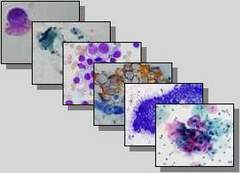
Education of Cytologists and Cytotechnicians
|
|
Education of Cytologists and Cytotechnicians |
The
professional training had begun before establishing the independent Section in the ZLH
(Croatian Medical Association), and, since that the active members have constantly
participated in different forms of education in cytology with their initiatives for the
organisation of education, creation of its
curriculum and its implementation. Nowadays,
there are two major forms of systematic education, which are: Post-graduate Study in
Clinical Cytology at the Medical School of the Zagreb University which was founded
in 1967. Until 1985 E. Hauptmann was its Head, and his assistants were Ž. Danilović
(1967/68) and I. Črepinko (1968/69 - 1984/85). In
the period between 1985/86 and 1988/89 the
Head was J. Ivić, and his assistant S. Audy-Jurković. Since !988/89 until today, the
Head has been S. Audy-Jurković, and the assistant V. Mahovlić. At the time of its
establishment, it comprised 556 study hours,
out of which one third were individual exercises
with microscope, because it was the only form of organised education. After the foundation
of specialization, the number of study hours was decreased at the expense of these
practical exercises with microscopes. Despite
comprehensive theoretical work, the post-graduate study does not provide sufficient
knowledge for independent practise of cytological diagnostics, since that requires
additional practical experience. This is the reason why it was necessary to educate
independent and competent experts who would deal with all branches of clinical cytology in
their full working time, which was accomplished in 1974 when the Specialization in
Clinical Cytology was organised. Since then, its programme has been rearranged on
two occasions in accordance with the current professional development and with the needs
of services in the field. In majority of Croatian towns there are
specialists of clinical cytology within different health centres. Developing the
co-operation among clinicians, pathologists and experts of other laboratory activities,
they are improving and accelerating treatment of patients, and participating in the
monitoring of therapeutical effects. In the
world there are different types of education in cytodiagnostics, starting from those
lasting for a few months to the independent specialization (being implemented in Croatia
for already 25 years) which has frequently been the issue of interesting debates at the
international gatherings. From the
beginning, members of the Croatian Society for Clinical Cytology have been organizing and participating in other forms of education: - courses in particular cytological areas (in gynecology,
hematology, endocrinology, urology, pulmonology) which were later on held as courses of permanent upgrading for doctors within
the Faculty of Medicine, and they were targeted for cytologists, as well as for doctors of other specialities; - testings for cytotechnicians in order to control and
keep the working quality in gynecological cytological laboratories as well as the course
for their training - in the undergraduate programme there is an elective
course "Introduction to Clinical Cytology", while the cytology of particular
areas is lectured by cytologists within pre-clinical and clinical courses (for instance,
Department of Embryology and Histology, Department of Gynecology and Obstetrics,
Department of Internal Medicine). Apart
from clinical cytology specialists, trained cytotechnicians are necessary for successful work in clinical cytological
laboratories. This is the reason why, in
1968, a 6-month course for additional training of cytotechnicians was organised, and from
1981 to 1991, an additional high school year (the five-year high school) for cytotechnicians was being organised. The
attempts to have this kind of training converted to the
post-high school education (lasting 2 years) for cytotechnicians are still being made.
(Inga Črepinko, Željka Znidarčić, Silvana Audy-Jurković. Clinical Cytology in Croatia - on the occasion of the 30th anniversary of the Croatian Society for Clinical Cytology of HLZ and the 25th anniversary of the specialization in Clinical Cytology, Zagreb, 2000) |